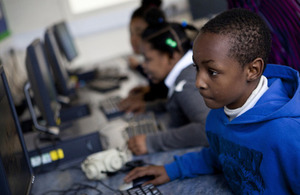Teaching the new computing curriculum
Elizabeth Truss announces funding for primary schools’ computing teaching.

Children using computers
Education Minister Elizabeth Truss has announced funding of £1.1 million for the British Computer Society (BCS) - the Chartered Institute for IT - to develop a computing readiness programme aimed specifically at primary school teachers with no prior experience of computer science.
She said the money would help primary schools deliver the rigorous new computing curriculum, which is introduced in September 2014.
The curriculum - praised by industry leaders including Google and Facebook - will ensure primary school children have practical experience of designing and writing computer programs, and that they can understand the fundamental principles of computer science.
Children from:
- the age of 5 will be taught what algorithms are and how they are used in digital devices - they will also learn how to write and test simple programs and to organise, manipulate and store digital content
- age 7, pupils will be taught to understand computer networks including the internet, and how they can provide a range of services, such as the worldwide web
The project, which will start immediately, will provide online resources, in-school workshops, outreach activities and create local support groups within the Network of Teaching Excellence in Computer Science - reaching at least 20,000 teachers.
The aim is that at least 800 local support groups will be started in primary schools as part of, and supported by, the Network of Teaching Excellence.
The Department for Education is already funding BCS, through Computing At School, with more than £2 million between now and 2015 to develop a network of teaching excellence in computer science. This will create a network of 400 ‘master teachers’ by 2015 who will lead continuing professional development in their local areas in partnership with employers, universities and professional bodies.
These teachers will each be expected to pass on their knowledge to 40 schools, so that technology teachers in 16,000 primary and secondary schools will be able to teach the government’s new computing curriculum and computer science GCSE. The Department for Education said:
This is a long-term project which will ultimately be self-sustaining. However, we know there is a more immediate challenge in accelerating teacher readiness to introduce the new curriculum - particularly at primary level.
Computing will be a compulsory part of the national curriculum for schools in England at all key stages from September 2014, and computer science will be included in the English Baccalaureate (EBacc) from next January.
Teenagers achieve the EBacc if they score at least a C at GCSE in English, maths, science - which can include computer science - history or geography and a foreign language.
Education Minister Elizabeth Truss said:
We want children to be enthused by the possibilities of computing - writing programs for computer games or designing apps for smartphones.
The new curriculum will do that and this funding will mean that primary school teachers - even those with little or no experience in teaching computing - will be able to deliver it.
DfE media enquiries
Central newsdesk - for journalists 020 7783 8300